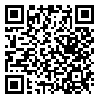1. Fazel P. Effect of a quality of life coaching intervention on psychological courage and self-determination. Shenakht Journal of Psychology & Psychiatry. 2017;4(1):89–109. [Persian] [
Article]
2. Deci EL, Ryan RM. Self-determination theory. In: Wright JD, editor. International encyclopedia of the social & behavioral sciences. 2nd ed. Oxford: Elsevier; 2015. pp: 486–91. [
DOI]
3. Mirkamali S-M, Khabare K, Mazari E, Farhadi Amjad F. The role of mental health on academic performance of university students with the meditation of academic achievement motivation. Knowledge & Research in Applied Psychology. 2017;16(2):101–9. [Persian] [
Article]
4. Leduc C, Bouffard T. The impact of biased self-evaluations of school and social competence on academic and social functioning. Learning and Individual Differences. 2017;55:193–201. [
DOI]
5. Zimmerman BJ. Becoming a self-regulated learner: an overview. Theory Into Practice. 2002;41(2):64–70. [
DOI]
6. Pintrich PR. Understanding self-regulated learning. New Directions for Teaching and Learning. 1995;1995(63):3–12. [
DOI]
7. Corno L. Self-regulated learning: a volitional analysis. In: Zimmerman BJ, Schunk DH, editors. Self-regulated learning and academic achievement: theory, research, and practice. New York, NY: Springer; 1989. pp: 111–41. [
DOI]
8. Milioni M, Alessandri G, Eisenberg N, Castellani V, Zuffianò A, Vecchione M, et al. Reciprocal relations between emotional self-efficacy beliefs and ego-resiliency across time. J Pers. 2015;83(5):552–63. [
DOI]
9. Low R, Jin P. Self–regulated learning. In: Seel NM, editor. Encyclopedia of the sciences of learning. New York: Springer; 2012. pp:3015–8.
10. Saif AA. Ravanshenasi parvareshi novin [Modern educational psychology].Tehran: Doran Pub;2019. [Persain]
11. Schunk DH. Learning theories: an educational perspective, pearson etext with loose-leaf version. 6th ed. Pearson; 2011.
12. Zimmerman BJ, Schunk DH, editors. Self-regulated learning and academic achievement: theory, research, and practice. New York: Springer-Verlag; 1989.
13. Scheithauer MC, Kelley ML. Self-monitoring by college students with ADHD: the impact on academic performance. J Atten Disord. 2017;21(12):1030–9.
14. Mirhosseini S-A, Kianfar R. Writing the world in a foreign language. Changing English. 2019;26(1):16–29. [
DOI]
15. White HA, Shah P. ADHD & autism spectrum disorder. In: Pritzker S, Runco M, editors. encyclopedia of creativity. Oxford: Academic Press; 2020. pp: 6–11. [
DOI]
16. Barkley RA. Defiant children: a clinician’s manual for assessment and parent training. 3rd ed. New York: The Guilford Press; 2013.
17. Guderjahn L, Gold A, Stadler G, Gawrilow C. Self-regulation strategies support children with ADHD to overcome symptom-related behavior in the classroom. Atten Defic Hyperact Disord. 2013;5(4):397–407. [
DOI]
18. Fadaee M, Nilforooshan P, Sadeghi A. Comparing the career development and procrastination in attention deficit- hyperactivity disorder students with common students. Research in Medical Education. 2015;7(3):49–56. [Persian] [
DOI]
19. Major A, Martinussen R, Wiener J. Self-efficacy for self-regulated learning in adolescents with and without attention deficit hyperactivity disorder (ADHD). Learning and Individual Differences. 2013;27:149–56. [
DOI]
20. Mayes SD, Calhoun SL. Frequency of reading, math, and writing disabilities in children with clinical disorders. Learning and Individual Differences. 2006;16(2):145–57. [
DOI]
21. Zumbrunn S. Nurturing young students’ writing knowledge, self-regulation, attitudes, and self-efficacy: the effects of Self-Regulated Strategy Development (SRSD) [Ph.D dissertion]. [Nebraska, USA]: University of Nebraska; 2010.
22. Ellison AT, Johnson BB, Noelle Harrell M. Attention Deficit/Hyperactivity Disorders (ADHD)☆. In: Reference module in neuroscience and biobehavioral psychology. Elsevier; 2019. [
DOI]
23. Sibley MH, Graziano PA, Ortiz M, Rodriguez L, Coxe S. Academic impairment among high school students with ADHD: The role of motivation and goal-directed executive functions. Journal of School Psychology. 2019;77:67–76. [
DOI]
24. McClelland MM, Wanless SB, Lewis KW. Self-regulation. In: Friedman HS, editor. encyclopedia of mental health. Oxford: Academic Press; 2016. pp: 120–7. [
DOI]
25. Conners CK, Erhardt D, Sparrow MA. Conners Adult ADHD Rating Scales (CAARS). New York: Multihealth Systems, Inc; 1999.
26. Wilson Van Voorhis CR, Morgan BL. Understanding power and rules of thumb for determining sample sizes. Tutorials in Quantitative Methods for Psychology. 2007;3(2):43–50.
27. Conners CK. Attention deficit hyperactivity disorder: the latest assessment and treatment strategies. 3rd ed. Kansas City, MO: Compact Clinicals; 2006.
28. Mokhtari H, Rabiei M, Salimi SH. Psychometric properties of the persian version of adult attention-deficit/hyperactivity disorder self-report scale. Iranian Journal of Psychiatry and Clinical Psychology. 2015;21(3):244–53. [Persian] [
Article]
29. Ryan RM. Control and information in the intrapersonal sphere: An extension of cognitive evaluation theory. Journal of Personality and Social Psychology. 1982;43(3):450–61.
30. Hamldar N, Gramidar M, Tajeri B. Investigating the psychometric properties of intrinsic motivation inventory. Psychometry. 2019;8(30):29–44. [Persian] [
Article]
31. Graham S, Harris KR. Writing better: effective strategies for teaching students with learning difficulties. Baltimore: P.H. Brookes Pub. Co; 2005.

 1، سید آیت رزمجو2
1، سید آیت رزمجو2 
 ، فرزانه دهقان3
، فرزانه دهقان3 




